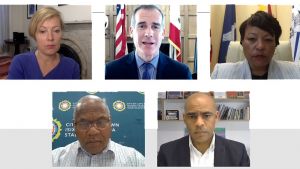Cities are now more connected than ever before on a global scale. Yet local governments are not just spectators of this networked age: they are actively forging links across borders, taking part in setting the international agenda, and shifting the landscape of urban politics from local to increasingly global.
Executive Summary
There are hundreds of formalized city networks around the world addressing a broad range of issues, and the potential of cities’ external engagements is as vast as it is untapped. City diplomacy is and must become a strategic activity for cities worldwide if they are to remain relevant in the new global order.
To get a more systematic look at the capacity of local governments around the world, select global cities were reviewed to explore their strategies, structure, expertise, and participation in networks. The following findings will inform future efforts to build capacity for more effective global engagement:
- The majority of cities have an international strategy and a dedicated international office.
- The city budget for global engagement is often minimal.
- Only a few cities reported that their staff has undergone dedicated training for city diplomacy.
- A majority of cities participate in international networks.
- A majority of cities reported that city diplomacy has had a positive impact on their cities.
Building on these initial findings, cities seeking to expand their international influence need to consider the following:
- Define a clear international strategy and coordinated approach.
- Better deploy resources toward managing international relationships and strategy.
- Prioritize engagements to avoid both over-commitment and opportunistic, short-term ventures.
- Measure the impact and value of city diplomacy.
- Integrate local demands with international agendas.
As cities increasingly become influential actors on the global stage, they need to invest in resources, expertise, and capacity to manage their relationships and responsibilities to conduct city diplomacy effectively.









